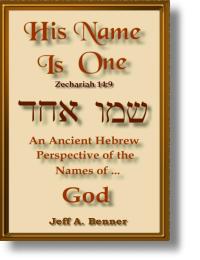Topics  God & YHWH God & YHWH 

The First and Second Names of God
By Mark Rosenblit
THE FIRST NAME OF GOD
The very first Name employed by God to identify Himself to the Jewish people and to the World is revealed in the very first sentence of the Hebrew Bible:
בְּרֵאשִׁית
בָּרָא
אֱלֹהִים
אֵת
הַשָּׁמַיִם
וְאֵת
הָאָרֶץ
, which is traditionally transliterated and pronounced as: Bereshit bara Elohim et HaShamayim v'et HaAretz, and which is traditionally translated as: “In the Beginning, God created the Heavens and the Earth.” (Genesis 1:1).
Although neither the Torah nor the remainder of the Hebrew Bible was written with diacritical symbols to represent vowels, disputes over pronunciation and meaning were originally nonexistent because, for generations thereafter, the Jewish people continued to read, write and converse with each other -- on an everyday basis -- in the Hebrew language. However, once increasing numbers of the Jewish people, under successive foreign Occupations, began to use a series of foreign languages (e.g., Aramaic, Farsi, Greek, Latin, and Arabic) amongst themselves in place of Hebrew, the vast majority of them eventually lost their inherent and intimate familiarity with the Hebrew language. This, in turn, led to differences of opinion as to the proper pronunciation of certain words in the Hebrew Bible that were susceptible of variant pronunciations and sometimes, on account thereof, of disparate meanings. During the Islamic Occupation of the Land of Israel (which began in the 7th Century CE), a group of resident Jewish scholars, known as the Masoretes, created and added diacritical symbols to the text of the Hebrew Bible, so that all issues with respect to pronunciation and meaning would be settled and, thereafter, be beyond disputation.
The diacritical symbols that the Masoretes added to the Name of God אלהים rendered this Name as אֱלֹהִים , which dictated that this Name be pronounced as Elohim.
Although, in Genesis 1:1, the Name of God אלהים , traditionally pronounced as Elohim, is the grammatical subject of the past tense, third person, singular form of the verb “to create”, there are those who, for very different reasons, have historically denigrated the singular and unitary Nature of the God of Israel by asserting that His Name אלהים is plural. The basis for this assertion is that, although God is beyond gender, the Hebrew-language suffix ים , pronounced as im, is indeed the plural suffix for (virtually all) masculine (and some feminine) nouns in the Hebrew language. Consequently, the Name of God אלהים would appear to be the masculine plural form of the Name of God אלוה (first appearing in Deuteronomy 32:15), traditionally pronounced as Eloah. Strengthening this assertion is the fact that the Hebrew Bible does, indeed, sometimes employ the word אלהים as a plural noun in order to describe, inter alia, the many gods of the pagan World. One example of this usage is: “You shall not have other gods (אלהים) in My Presence” (Exodus 20:3). Another example of this usage is: “For, he will cause your child to turn away from [following] after Me, and they will worship gods (אלהים) of others …” (Deuteronomy 7:4). A further example of this usage is: “And the curse: If you do not hearken to the Commandments of HaShem, your God, and you stray from the Path that I command you Today, to go after gods (אלהים) of others …” (Deuteronomy 11:28).
This circumstance has allowed atheists to claim that the presumed plural structure of the Name of God אלהים is conclusive proof that the God of the Hebrew Bible is merely the remnant pagan deity of an ancient Mesopotamian pantheon, while it has simultaneously allowed certain sects of Christianity to claim that the presumed plural structure of this Name is conclusive proof that their triune god (i.e., the Christian godhead consisting of the “Father”, the “Son” and the “Holy Spirit”) is, in fact, the God of the Hebrew Bible.
However, perhaps the Masoretes deliberately misapplied their diacritical symbols to the Name of God אלהים .
Although the Hebrew Bible employs the suffix ים, pronounced as im, to represent the typical plural form of the masculine noun, it also employs the same suffix (or its variant יים) to represent the plural form of any noun (whether masculine or feminine) which (a) identifies a body part that always exists as a pair (e.g., hands, feet, eyes and ears) or (b) constitutes the doubling of a quantity (e.g., two days, two weeks, two years, two hundred, and two thousand). However, whenever the Hebrew Bible employs the suffix ים (or its variant יים) in this way, the suffix is not pronounced as im, but rather as ayim.
Yet, there is one additional category of nouns to which the Hebrew Bible applies the suffix ים, pronounced as ayim. This category consists of certain rarefied things, each of which exists in the form of a continuum (e.g., life, water and sky/heavens). In particular, when this suffix is employed to identify something that exists in the form of a continuum, the suffix does not refer to something that is plural. Rather, it refers to something that is beyond classification as either singular or plural.
God is certainly in this category. He is the Ultimate Continuum, as He is Incorporeal, Omnipresent, Omnipotent, Omniscient and Eternal. And He would be beyond classification as either Singular or Plural, but for the fact that He has declared -- repeatedly -- to the Jewish people and to the World that He is Singular (see, e.g., Deuteronomy 4:39 and 6:4; Isaiah 44:6 and 45:21-23; and Zechariah 14:9).
Consequently, I believe that the proper pronunciation of the first-revealed Name of God אלהים is not Elohim (which suggests a plural nature), but rather Elohayim (which suggests a Continuum). Conversely, whenever the word אלהים is employed to describe the many gods of the nations, it should, indeed, be pronounced as elohim.
Yet, if this be the case, then why does the Hebrew Bible also identify God by a Name which appears to be the singular form of אלהים -- namely, אלוה (Eloah)? The answer is that the Name of God אלוה is not the singular form of the Name of God אלהים, but rather a shortened version thereof. Moreover, אלהים is not the only Name of God for which the Hebrew Bible sometimes employs a shortened version. For, the second Name employed by God to identify Himself to the Jewish people and to the World, which is the Ineffable Name יהוה (first appearing in Genesis 2:4), is sometimes shortened in the Hebrew Bible to יה (first appearing in Exodus 15:2), traditionally pronounced as Yah.
Yet, does not the Hebrew Bible’s employment of the word אלהים , in its plural sense (as elohim), to describe the many gods of the nations, imply the existence of a singular form thereof? Yes. In that circumstance, the singular form of the word אלהים (meaning “gods”) is the word אל (meaning “a god”), traditionally pronounced as el. Nonetheless, with appropriate adornment or context, even אל often refers to the One God (e.g., אל עליון, transliterated as “El Elyon”, meaning “God Most High” -- Genesis 14:18; and אל שדי, transliterated as “El Shadai”, meaning “God Almighty” -- Genesis 17:1; and אל עולם, transliterated as “El Olam”, meaning “God of the Universe” -- Genesis 21:33; and place names such as בית-אל, transliterated as “Bethel”, meaning “House of God” -- Genesis 28:19; personal names such as דניאל, transliterated as “Daniel”, meaning “God is My Judge” -- Daniel 1:6; and those circumstances in which it is otherwise clear that אל, standing alone, is the Name of God אל, such as the employment of that Name by the gentile prophet Balaam -- see Numbers 23:8, 23:19, 23:22 and 23:23).
Finally, why would the Masoretes deliberately create a mispronunciation -- Elohim -- for the first-revealed Name of God אלהים ? Perhaps the Masoretes desired to keep the true pronunciation of this Name a secret for the same reason that they chose not to create any pronunciation for the second-revealed Name of God יהוה, which, due to its lack of meaningful diacritical symbols, is known as the Tetragrammaton (i.e., the “Four Letters”) and is reverentially pronounced as “Adonai” (meaning “My Lord”), while being rendered for translation purposes as “HaShem” (meaning “The Name”). Perhaps, by this means, the Masoretes sought to protect both Names from being blasphemed.
© Mark Rosenblit
THE SECOND NAME OF GOD
The second Name employed by God to identify Himself to the Jewish people and to the World is יהוה (see Genesis 2:4). This Name is never written with meaningful diacritical symbols, thereby preventing anyone living Today from knowing how to pronounce the Name. Consequently, this Ineffable Name is known as the Tetragrammaton (i.e., the “Four Letters”) and is reverentially pronounced as “Adonai” (meaning “My Lord”), while being rendered for translation purposes as “HaShem” (meaning “The Name”).
It is generally agreed among Hebrew Bible scholars that the Name of God יהוה is derived from the Hebrew-language verb להיות (meaning “to be” or “to exist”), based upon the following passage from the Hebrew Bible:
Moses said to the [one and only] God, “Behold, when I come to the Children of Israel, and I will say to them, ‘God of your forefathers has sent me unto you’, and they say to me, ‘What is His Name?’ -- what shall I say unto them?” And God said to Moses, “I Shall Be Who I Shall Be” [alternative translation: “I Shall Exist As I Shall Exist”]; and He [God] said, “So shall you say to the Children of Israel, ‘I Shall Be has sent me unto you.’ [alternative translation: ‘I Shall Exist has sent me unto you.’]” And God further said to Moses, “So [also] shall you say to the Children of Israel, ‘HaShem, God of your forefathers -- God of Abraham, God of Isaac and God of Jacob -- has sent me unto you.’ This is My Name forever, and this is My Remembrance from generation to generation.” (Exodus 3:13-15)
In this passage, God first identifies Himself as אהיה (“I Shall Be” or “I Shall Exist”), being the future tense of the first person singular form of the verb להיות, and He then conflates His Name אהיה with His Name יהוה (rendered in the passage as “HaShem”) by instructing Moses to essentially declare that both Names have sent Moses to the Jewish people. Notwithstanding the Divine Conflation, one Name is not an anagram of the other Name, as the Name of God אהיה contains an “aleph” (but not a “vav”), while the Name of God יהוה contains a “vav” (but not an “aleph”). However, all of the letters of the Name of God יהוה can be found interspersed among the three tenses of the third person singular form of the verb להיות, reflecting recognition of the Eternal Nature of God from the perspective of the Jewish people, to wit: היה (“He [always] Was”); הווה (“He [always] Is”); and יהיה (“He [always] Shall Be”).
Does knowing the likely etymology of the Tetragrammaton teach us how to pronounce this Name? Possibly. I will return to this question.
There seems to be a linguistic connection between the Name of God יהוה and the Name of God אלוה (first appearing in Deuteronomy 32:15), as (1) the first two letters of each Name of God, to wit: יה and אל, each constitute, in and of themselves, a Name of God (first appearing, respectively, in Exodus 15:2 and in Genesis 14:18), and (2) the last two letters of each Name of God, to wit: וה, are identical. Accordingly, due to these similarities in function and structure, I was initially inclined to believe that the Name of God יהוה would most likely be pronounced with the same vocalization as the Name of God אלוה, traditionally pronounced as Eloah. If so, this would render the pronunciation of the Name of God יהוה as Yehoah -- a Name that projects Power and evokes Awe. Moreover, this pronunciation of the Name incorporates sounds from all three tenses of the third person singular form of להיות, to wit: Ye (from the future tense: יהיה) Ho (from the present tense: הווה) Ah (from the past tense: היה).
However, then I recalled the following passage from the Hebrew Bible concerning the fateful encounter between God and the Prophet Elijah on Mount Horeb:
And He [God] said [to Elijah], “Go out [from the cave] and stand on the mountain before HaShem”; and behold, [Elijah perceived] HaShem passing by, and a great and powerful Wind, smashing mountains and breaking boulders, before HaShem; [but he realized that] HaShem is not in the Wind; and after the Wind, an Earthquake, [but he realized that] God is not in the Earthquake. And, after the Earthquake, a Fire, [but he realized that] HaShem is not in the Fire; and after the Fire, a quiet slender Voice. And it happened that when Elijah heard [this Voice], he wrapped his face in his mantle, and he went out and stood by the entrance of the cave; and behold, [there appeared] unto him a Voice saying, “Why are you here, Elijah?” (I Kings 19:11-13)
And I thought that perhaps the Name of God יהוה is not intended to project Power or evoke Awe. Instead, perhaps this second-revealed Name is intended to represent the quiet slender Voice of God that Elijah encountered on Mount Horeb. Perhaps, by the earlier conflation of His Name אהיה with His Name יהוה, God meant to convey to the Jewish people that the Name of God יהוה is supposed to be pronounced with the same vocalization as the Name of God אהיה, traditionally pronounced as Ehiyeh. If so, this would render the pronunciation of the Name of God יהוה as Yehiweh -- a Name that ends in a Whisper.
And there is yet another possibility. Perhaps, like Quantum Theory (which seeks to explain the duality of the subatomic object, sometimes presenting itself as a particle and sometimes presenting itself as a wave), the Name of God יהוה exists as an Aural Duality, being sometimes pronounceable as Yehoah and sometimes pronounceable as Yehiweh.
Obviously, no one can know whether Yehoah and/or Yehiweh (or any other theorized pronunciation) is correct.
Perhaps, when the Messiah comes, he will enlighten us. May it be so!
© Mark Rosenblit
 |
|
|
Related Pages by Jeff A. Benner
 | | His Name is One (Book)
An examination of the Hebrew words and names used for God and their interpretation from an ancient Hebrew perspective. |
 | | The Nature of God (Article)
The Hebraic perspective of God is a balance within the attributes of God. |
|






